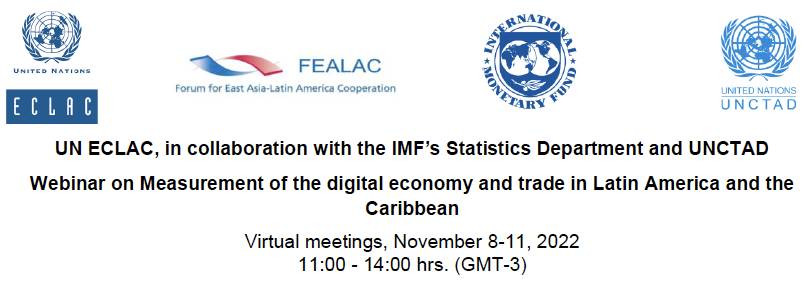News
Webinar on Measurement of the digital economy and trade in Latin America and the Caribbean
UN ECLAC, in collaboration with the IMF’s Statistics Department and UNCTAD.
Context: The pandemic has accelerated the digital transformation of Latin America’s economy and trade. This region has been among the fastest growers of e-commerce worldwide, albeit at low levels, while exports and imports of digitally enabled services have also expanded. These trends and transformations pose serious measurement challenges, hindering policy formulation, monitoring, and evaluation. In this context, this webinar addresses conceptual and practical aspects related to measuring the digital economy and trade in digital goods and services for the national accounts and balance of payments statistics. This webinar –organized by UN-ECLAC in collaboration with the IMF’s Statistics Department (STA) and UNCTAD with financial support from the Forum of East Asia and Latin American Countries (FEALAC)– is aimed at Latin American and Caribbean countries.
Goals: Central banks and statistical offices in Latin America and the Caribbean are at an early stage of measuring the digital economy and trade. They are keen to learn more about good international practices regarding the approaches and recent experiences to measuring the digital economy and the export and import flows of digital goods and services and improving the capacities to better estimate production, value added, and trade flows.
Description: The webinar includes four 180-minute sessions over four consecutive days, including short lectures, country case studies, and hands-on statistical exercises for statisticians. It fosters a dialogue between officials from Latin American and the Caribbean countries and staff from UN-ECLAC, STA, and UNCTAD centered around conceptual and practical issues related to the measurement of the digital economy and trade. Several case studies, mainly from the region, will be used. The statistical exercises will provide practical guidance to compilers on various aspects of measuring the impact of digitization on economic activities and trade, as well as facilitate peer learning. The following program is proposed:
-
Day one focuses on the measurement challenges of the digital economy. Presentations and country cases will address the following topics: definitions and core statistics of the digital economy, the compilation of digital supply and use tables as the statistical tool endorsed by the international agencies to measure the digital gross value added, and the use of input-output matrices to measure digitization of the economic sectors.
-
Day two examines e-commerce and digital intermediary platforms. A set of lectures, country cases, and a statistical exercise will cover the progress and challenges on these topics.
-
Day three addresses cross-border digital trade. The status of the international standards in this field and a set of country cases complemented will be presented.
-
Day four is dedicated to examining how big data can help to collect economic statistics.
Format and target audience: The webinar includes presentations, country case studies, statistical exercises, and questions and answers sessions. It is aimed at representatives from Central Banks and National Statistics Offices in charge of measuring digital production and trade for policy formulation.
Attached: Agenda and presentations.



